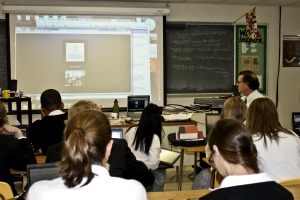In social studies teacher Robert Schick’s class, everyone is on Skype.
On Feb. 25, at approximately 8:30 a.m., the first section of Schick’s Western Civilization class connected with Sarah Mourad, a woman from Egypt, through a Skype call.
Schick met Mourad through Facebook and arranged for her to talk with his classes about her personal experience with the revolution as well as the role social media played in it.
“I thought someone who had experienced this revolution firsthand would be an excellent primary source of information for my students,” Schick said.
Schick required each of his students to submit ten questions that inquired about both Mourad’s life in Egypt in general as well as the revolution.
“We integrated our studies of ancient Egypt with these historic events in present-day Egypt. Students did preliminary research on President Mubarak and watched ‘Revolution in Cairo,’ which is part of the Frontline series produced by PBS,” Schick said.
During Schick’s first class, Mourad informed the students that most Egyptians do not speak English due to educational issues arising from the corrupt regime of Muburak, but she had the opportunity of learning to speak it conversationally.
Mourad studied mass communication and journalism in the American University of Cairo, and she currently works as an internship coordinator. On the side, her hobby is making Beatles videos.
Afterwards, the students were called up one by one to introduce themselves and ask two of their best questions.
Mourad gave facts about what happened during the revolution, such as the death and injury toll as well as the censorship and internet disruption the government issued, and personal accounts of what she experienced. She informed students that she was never personally put in danger. However, she heard stories from friends of violent actions the police were doing to protestors.
“I thought that she was really into the whole situation and it shows Egyptian people are really in depth in their community,” freshman Billy Decker said.
Mourad ended with her thoughts on the protests occurring in Libya as well as the future of Egypt. She voiced her concerns for the “disturbing” actions of Libyan president Muammar Gaddafi, but reassured the students that help is indeed being sent from Tunisia and Egypt to Libya, and that both countries are hoping for the liberation of Libya.
“All three of my sections had a chance to speak extensively with Sarah, for an average of thirty minutes per class. She was very informed, friendly, and enthusiastic with us. It was a fantastic opportunity to hear about this world-shaking event from someone who experienced it directly,” Schick said.
Grace Kim is a Managing Editor for “The Patriot” and jcpatriot.com.



